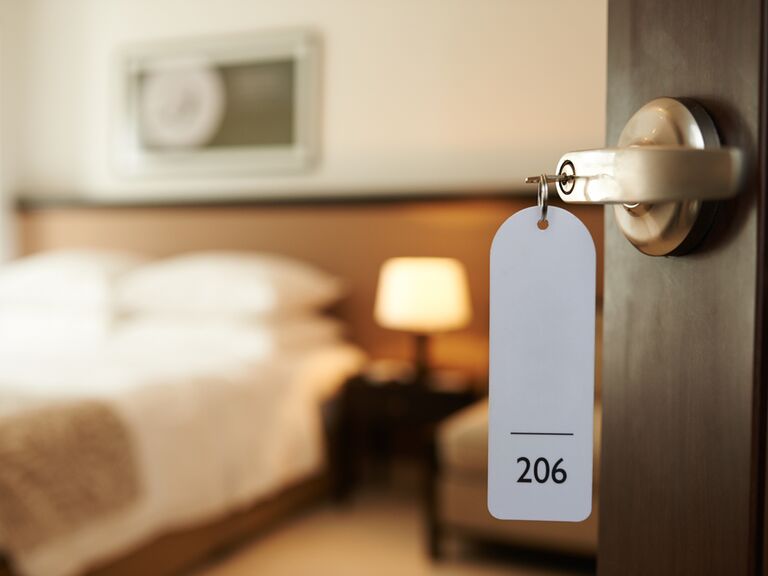This Is How to Reserve Wedding Hotel Room Blocks

It doesn't matter if you're inviting out-of-town loved ones to your local celebration or planning a destination wedding, your guests will need a place to stay. You certainly don't want them crashing the to-be-wed suite. That's why many couples love booking a hotel room block because it gives guests their own space, allows them to stay in the same accommodation as other guests and makes wedding planning and transportation easier. Plus, it's a more fun experience for your guests, who may want to mingle and create their own after-party. While it's not difficult, it can be time-consuming to book hotels, and there are some important details to consider. That's why we created this easy-to-follow guide to blocked rooms for weddings. Whether you contact the hotels directly or use a booking platform, you'll find everything you need to know to make it happen.
Room block information in this article:
Definition | Types | Number of Rooms | When to Reserve | Cost | Set Up | Negotiations | Guests Booking | Tips
What Is a Hotel Room Block?
A hotel room block is a group of rooms a hotel sets aside for an event at a pre-negotiated group rate to be booked and paid for by the attendees. Usually, a minimum of 10 rooms and as many as 30 rooms can be blocked.
Wedding hotel blocks perks
In addition to a better room rate, reserving a room block can come with other bonuses. Be prepared to ask what's included and have your list of requests ready. Some of these hotel room block upgrades include:
- A complimentary room for the to-be-weds
- Early check-in time or late check-out
- Free Wi-Fi
- Turn down service
- Wedding welcome bag distribution to the rooms
- A hospitality suite
- Transportation (to and from the wedding venue or airport)
Types of Hotel Room Blocks
There's no one way to go about booking hotel blocks for a wedding. Here are typically the two types you can choose from.
Local hotels vs. destination weddings
For a local wedding, you'll want to reserve a room block at a nearby hotel with easy access to your venue. Many couples who need 20 to 30 rooms reserve spaces at two to three hotels to offer guests a choice of location and room rate. Also, if you've chosen a hotel wedding venue for your celebration, a room block could be reserved at the same hotel and negotiated as part of your event.
When planning a destination wedding, the same principles apply. If you're hosting a wedding at a resort, you probably want to spend more time with your guests. Therefore, destination wedding packages usually include a room block to ensure all your guests have a place to stay. If your destination wedding is in an area with lots of accommodations, then you should offer your guests multiple selections. However, you should only do this if you have a large guest list, so it makes the effort worthwhile.
Courtesy vs. contracted
A destination wedding resort or hotel wedding venue might include a courtesy room block in their packages as a sweetener to their offering. A courtesy room block means you have no financial obligation to fill the rooms, even if it's part of your contract. A contracted room block, on the other hand, means negotiated terms must be met, such as a deposit, cancellation policy, minimum bookings or much more. (We'll get into the finer details about hotel room block contracts below.)
How Many Rooms to Block for a Wedding
How do you calculate room blocks? To determine how many rooms you'll need to reserve, answer the below questions first.
1. How many out-of-town guests will need a room?
Estimate the number of households that will need accommodations by dividing the number of attending guests by two. Then, estimate what percentage of your out-of-town guests will book a room––for example, the numbers will probably be 80% for a local wedding and 100% for a destination wedding.
Here's how to break it down. If you don't know how many rooms to block for a local wedding with 150 guests, 50 of them being from out-of-town, divide 50 by two, which equals 25 households. Then multiply 80% (the percentage estimate of out-of-town guests booking a room for a local wedding) by 25 and get your final answer of 20 potential hotel rooms.
Now for the last example. Here's how many rooms to block for a 200-person wedding. Let's say it's a local wedding with 140 out-of-town guests, and 60% will book a room. Divide 140 by two, which results in 70 households, and multiply that by 60% to get a 42 hotel room estimate.
2. How many nights are they likely to stay?
This answer will depend on how far your guests are traveling and your wedding itinerary. Discuss with your partner the number of nights your guests need to stay at the accommodation.
3. Will your wedding party or immediate family members need a room?
Even if they live in town, sometimes wedding party and family members want to stay at the hotel for an enhanced wedding experience. Reach out to them early for a room commitment to ensure they're booked.
4. Local wedding guests
You'll need to consider the local wedding guests who may not want to drive home after the festivities. This is trickier to estimate, so we suggest you hold off on reserving on their behalf and offer leftover rooms closer to the wedding date to help meet your booking commitment.

When to Reserve a Hotel Room Block
Now that you've estimated the number of rooms, timing is your next key consideration. To get the best options for your desired dates, you should reserve your hotel room block ASAP. Also, if your wedding date coincides with a seasonal holiday, local event or convention, you'll need to reserve your room blocks at least 10 to 12 months in advance. Having the rooms booked before the save-the-dates go out, traditionally done eight months before the wedding, is beneficial so guests know where to stay as they think about their travel arrangements.
Does It Cost Money to Block Hotel Rooms?
Some venues might require a deposit for the wedding hotel blocks, but this isn't common. If the accommodation you're looking at requires a deposit, it will typically be 10% to 50% of the total room cost. Try to ask for a courtesy room block before taking this route.
Who pays for hotel blocks?
Traditionally, the bride's family pays for the wedding party's accommodations, so any hotel room block fees will fall to them. This doesn't mean the family must pay for each guest's nightly hotel room rate––only VIPs, if their budget allows.
How to Block Hotel Rooms for a Wedding
Follow these how-to reserve a block of hotel rooms steps so you can book with ease. You'll guests will be comfortable in their rooms in no time.
Think of the number of hotels you'll need.
If you happen to be getting married at a venue with accommodations, start there. Ask the venue manager about room rates and a possible discount for guests who reserve early. You should reserve hotel room blocks with at least two hotels under certain conditions:
- You're having a destination wedding with a lot of out-of-town guests.
- You're getting married at a hotel with exceptionally pricey rooms.
- You have a larger-than-average guest list (more than 140 people).
- You'd like to offer different price points for your guests.
Contact the hotels directly.
To reserve a wedding room block for your guests, you'll want to narrow your search to two (at most three) hotels and give each a call. When you call to reserve, give the room block coordinator the dates you expect your guests to be there, plus any special requests. Some examples include dropping welcome bags at the door or transportation to and from the airport. Also, ask the hotel if they provide regular updates on room bookings by your guests so you can add more if needed.
Use HotelPlanner.
If figuring out how to book a block of hotel rooms sounds like a hassle, save yourself time by using HotelPlanner, our premier hotel room block reservation service. With partnerships with major hotel chains and certified planners that boast decades of industry experience and collectively speak 28 different languages (hint, hint for destination wedding couples), HotelPlanner is your one-stop shop for your group's hotel reservations.
HotelPlanner lets you search all the major hotels near your venue, recommends lodging and helps you negotiate a great price and reserve your room blocks in one place. All it takes is a simple informational questionnaire, and you're matched with a local expert who can help you every step of the way.
How to Negotiate a Hotel Room Block Contract
Once you've found a block of rooms that works for your wedding, you'll likely need to sign a contract to finalize the booking. There's certain terminology you'll need to understand when reviewing the contract terms for a hotel block. Read your hotel room block contract carefully before signing, and be on the lookout for the following clauses.
- Cancellation Policy
What this means: The conditions under which you can cancel rooms and any financial penalties associated with your cancellation.
- Deposit
What this means: The amount of money you have to pay (if any) the hotel to reserve the room block, and the terms that need to be met to get your deposit back.
- Allowable Shrinkage Clause
What this means: This number is the percentage of unbooked rooms allowed.
Target Percentage: Between 10–20%. So if you booked 20 rooms, but two to four go unbooked, you won't be penalized with a fee.
- Attrition Clause or Minimum Commitment
What this means: The attrition rate refers to the percentage of rooms that need to be filled to avoid paying a penalty fee.
Target Percentage: Between 80–90%. Example: If the entire hotel room block isn't used, you'll owe the hotel damages for all unused rooms based on a minimum commitment of 80%. So if you don't book the minimum amount of rooms agreed to, you'll owe the difference up to 80% of the room block.
- Mitigation Clause or Resell Clause
What this means: The hotel must book unused rooms in your block so you're no longer responsible for them if they're sold to other customers later. In short: You shouldn't be paying for rooms other hotel guests are paying for.

How Wedding Guests Book Rooms
Once you set up a wedding room block, most hotels will give you a unique web link to share with your guests so they can book and pay for their hotel rooms. Alternatively, they'll provide contact info for the destination wedding planner or room block coordinator to make guests' reservations.
Bonus: HotelPlanner offers a free event website to send to your group with all the hotel options listed in one place.
Let guests know your hotel block information.
The best way to communicate your hotel block information is to include it on your wedding website, so ensure you tell them how to find it. That way, all your guests will be well-informed and can easily click to learn more about the accommodation options available. If you have guests coming from out of town, it's also a nice gesture to include additional information on how to get to the venue or if transportation will be provided. Also, consider including contact information for your wedding planner or a family member on your website so guests can reach out to them directly if they have questions about directions or accommodations.
Hotel room block wording example
Create a special message for our out-of-town guests by using our example.
Thank you for making the journey to celebrate with us!
We're delighted to have family and friends from near and far coming to our wedding. To help you find accommodations, we have reserved a block of hotel rooms for [insert number] nights from [insert date] to [insert date] at the [insert hotel name(s)].
If you wish to book a room at a special group rate that we've negotiated on your behalf, visit this website [insert link] or call [insert phone number] before [insert a cut-off date] to ensure you have a place to stay, as space is limited. [If required, provide a reference number.]
Hotel Room Block Booking Tips
It never hurts to do a little recap. Here's a checklist of booking tips to help you with this important wedding planning task.
1. Figure out the number of rooms you need.
Focus on out-of-town guests, yourselves, the wedding party and immediate family. Only offer local guests a room as your fallback position (i.e. filling unbooked rooms) to avoid reserving too many rooms and paying financial penalties.
2. Determine the number of nights needed.
As mentioned earlier, give some serious thought as to the number of nights your guests will be staying. Think of wedding weekend festivities like the rehearsal dinner, welcome party or postwedding brunch as events that may require extra nights.
3. Pick multiple hotels for the room blocks.
Reserve hotel rooms at two to three hotels to give your guests a choice and to secure enough rooms. Avoid more hotels than this because it takes too much time to coordinate, and you'll risk not meeting your booking threshold at each hotel.
4. Look at pricing for your guests.
Not all wedding guests' budgets are equal. That's why you should choose hotels with different price ranges so your guests are comfortable with the hotel rate they're paying.
5. Choose the right hotel location.
Having hotel room blocks near your wedding venue is ideal as taxis or ride-share options can add up fast if the hotel is far away. You want to make the group rate you negotiated as beneficial as possible.
6. Consider the booking process.
You'll want to make it easy for guests to book their rooms. Provide links on your wedding website and send out an email to VIPs. Don't be afraid to send a gentle reminder to out-of-town guests who have RSVP'd but may have forgotten to book an accommodation.
7. Get booking updates.
Ask your wedding hotel room block coordinator to provide regular updates on guest bookings. This helps you ensure there are enough rooms available and/or lets you know what remaining rooms need to be filled.
8. Look into wedding transportation.
Give your guests tips on wedding transportation to and from your venue––whether it's from the airport, train or bus station. Bonus points if your hotel offers a shuttle service.
9. Add personal touches.
Discuss extra services like welcome bag distribution, turn down, signage and more with the hotel manager or your room block coordinator. Be sure to ask if there are any additional charges for these services.
Chapelle Johnson contributed to the reporting of this story.




















